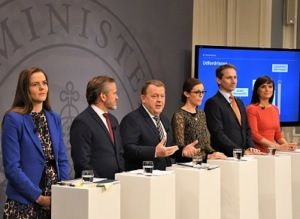News
PM’s health reform aims at prioritising patients’ needs
This article is more than 6 years old.
The government wants to make some radical changes to the Danish health system

The government was out in force to promote its new health initiative (photo: Hasse Ferrold)
At a press conference earlier today Prime Minister Lars Løkke Rasmussen, flanked by five other members of the government, outlined some far-reaching initiatives on health policy.
One major change is doing away with the five publically-elected Regional Authorities and replacing them with five health management bodies situated in Aalborg, Viborg, Vejle, Sorø and Hillerød.
Additionally, 21 local combined health groups attached to hospitals with A&E facilities (akutsygehuse) covering on average 4-5 municipalities will build bridges between hospitals, GPs and the municipality.
Finally, a national authority called Sundhedsvæsen Danmark will be responsible for raising the quality of treatment across the whole country, reports Politiken.
Getting to grips
The government intends to establish a fund with 6 billion kroner to kickstart the reforms.
“This is a suggestion for reform – a development plan – that gets to grips with the problems that far too many patients experience today,” said the PM.
“Too many people travel far too far to receive relatively simple treatment and go to check-ups – for example, patients with chronic obstructive lung disease and diabetes. There is a lack of co-ordination,” he added.
The title being given to the reform is ‘Patienten først – nærhed, sammenhæng, kvalitet og patientrettigheder’, which roughly translates as ‘The patient first – nearness, interrelation, quality and patients’ rights’.
A more homogeneous system
The PM also pointed out that there is much too big a difference in the quality of treatment available depending on where a person lives.
“We’re facing a challenge that will only get bigger. During the next decade there will be around a quarter of a million more 75-year-olds and the number of diabetics is expected to double,” said the PM.
As the government sees it, the way around the problem is for more people to be treated locally and by their own GPs.
The PM also mentioned the need to train more nurses and GPs, and to that end it will launch a number of concrete initiatives on Friday.
Money more important than patients
Reaction to the PM’s initiatives was not slow in coming. The deputy mayor for health in Copenhagen, Sisse Marie Welling, was not impressed.
Regarding the proposal to do away with the Regional Council, she said: “You won’t get better decisions taken just because civil servants and accountants are put in charge of health policy. I’m worried that money will be the primary element in the new system instead of a co-ordinated treatment of patients.”
She also pointed out that Copenhagen is already short of 20 doctors, and that the ones that are there cannot accept any more patients.
“Doctors just can’t take on any extra tasks, and that’s exactly what the government will be giving them when the goal is 500,000 fewer visits to hospital and 40,000 fewer hospital admissions in 2025,” added Welling.










































